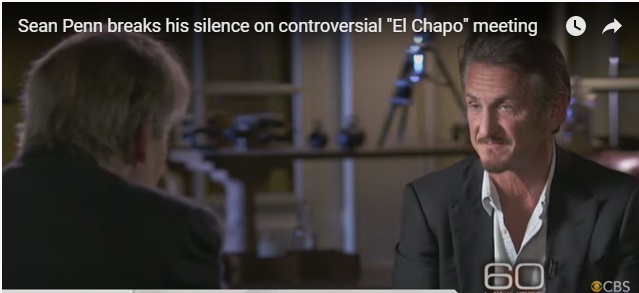In the wake of his controversial Rolling Stone interview with Mexican drug lord El Chapo, Sean Penn is finally breaking his silence in aninterview with Charlie Rose for “60 Minutes.” The full segment, which is set to air on CBS on Sunday night (Jan. 17), discusses both his meeting with the infamous cartel boss and the subsequent magazine cover story.
“I have a terrible regret,” Penn says in the interview. “I have a regret that the entire discussion about this article ignores its purpose, which was to try to contribute to this discussion about the policy in the war on drugs.”
The media’s reaction to the article has largely focused on how Penn managed to contact El Chapo, at the time a fugitive from Mexican authorities, as well as the mechanics of Penn’s foray into journalism. Some in the media have also questioned Rolling Stone’s decision to allow the drug lord final approval over the story before it was published.
Penn told Charlie Rose that he was deeply disappointed with the coverage of his piece. “My article failed,” he said. “Let me be clear. My article has failed.”
El Chapo was arrested by Mexican law enforcement on Jan. 8, six months after escaping a maximum security prison through an underground tunnel. Penn’s article was published the next day, and Mexican officials said his meeting with the drug lord was instrumental to their operation to recapture him.
Penn denied this claim in the “60 Minutes” interview, saying he had met with El Chapo in October, months before his arrest. The actor also suggested the Mexican government made the claim out of embarrassment.
“We know that the Mexican government, they were clearly very humiliated by the notion that someone found him before they did,” he said. “Well, nobody found him before they did.”
Rose asked Penn if he believes the Mexican government intentionally put him in harm’s way by making that claim:
Rose: Do you believe that the Mexican government released this in part because they wanted to see you blamed and to put you at risk?
Penn: Yes.
Rose: They wanted to encourage the cartel to put you in their crosshairs?
Penn: Yes.
Rose: Are you fearful for your life?
Penn: No.
When Penn decided to pursue the interview with Guzman, he said he only had one thought.
“This is somebody who — upon whose interview could I begin a conversation about the policy of the war on drugs. That was my simple idea,” Penn said.
“‘We’re going to put all our focus — forget about blame — we’re going to put all our focus, all our energy, all our billions of dollars on the ‘bad guy,’ and what happens? You get another death the next day the same way,” Penn added.
“Do you make a moral equivalency between El Chapo and people who either buy or sell drugs in America?” Rose asked.
“I do, if it’s me,” Penn said. “I don’t make that judgment for everyone else. But I wouldn’t go so far as to buy or sell drugs.”

“So he’s no better than you or no worse than you,” Rose said.
“I can’t make him worse than me if I’m not out there doing everything that I can to get a conversation going on the way in which we prosecute that war,” Penn said.
In an email exchange with the Associated Press Monday about his meeting with Guzman, Penn said, “I’ve got nothin’ to hide.” But he told Rose he has “a terrible regret.”
“I have a regret that the entire discussion about this article ignores its purpose, which was to try to contribute to this discussion about the policy in the War on Drugs,” Penn said.
“Let’s go to the big picture of what we all want. We all want this drug problem to stop. We all want them — the killings in Chicago to stop,” Penn added. “We are the consumer. Whether you agree with Sean Penn or not, there is a complicity there. And if you are in the moral right, or on the far left, just as many of your children are doing these drugs … And how much time have they spent in the last week since this article come [sic] out, talking about that? One percent? I think that’d be generous.”
“You’re saying there’s not much dialogue about–”
“My article failed,” Penn said.
“As a result of El Chapo,” Rose said.
“Let me be clear. My article has failed,” Penn responded.
Penn and Rolling Stone also took heat for allowing Guzman to review Penn’s article before it was published in the magazine. Rolling Stone publisher Jann Wenner defended the magazine’s decision to give El Chapo what he called “story approval,” saying “it was a small price to pay.”
Penn described himself as an experiential journalist, someone who writes about his experiences and not about things he wasn’t present for.
“When you get the story that every journalist in the world wanted, there’s a lot of green-eyed monsters who gonna come give you a kiss,” Penn said.
“Those are jealous journalists you’re suggesting,” Rose said.
“That, yes. …Of course I know that there are people who don’t like me out of the gate,” Penn said.
“You’re not without controversy,” Rose said.
“Not without controversy. Fair enough,” Penn said. “At the same time, you know, when…’journalists’ who want to say that I’m not a journalist — well, I want to see the license that says that they’re a journalist.”
Penn also told Rose he thinks he was able to get access to El Chapo because he’s not a traditional journalist, and he doesn’t think any traditional journalist would have had success.
Sources:

